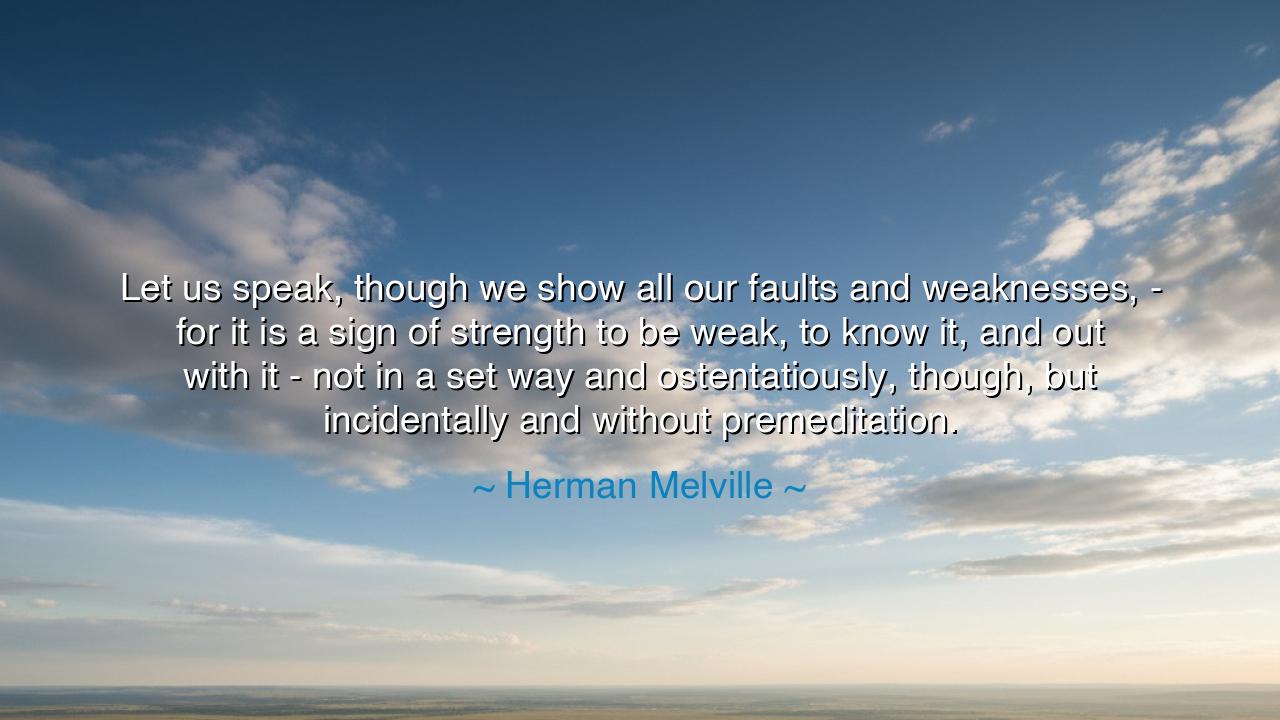
Let us speak, though we show all our faults and weaknesses, -
Let us speak, though we show all our faults and weaknesses, - for it is a sign of strength to be weak, to know it, and out with it - not in a set way and ostentatiously, though, but incidentally and without premeditation.






Hear the voice of Herman Melville, the sailor-philosopher, the weaver of the great whale’s tale, who once declared: “Let us speak, though we show all our faults and weaknesses, – for it is a sign of strength to be weak, to know it, and out with it – not in a set way and ostentatiously, though, but incidentally and without premeditation.” These words are a lantern in the darkness, reminding us that the greatest courage is not the hiding of weakness, but the revealing of it. For to confess one’s frailty is not to diminish oneself, but to prove the sturdiness of one’s spirit.
When Melville speaks of showing faults and weaknesses, he calls us away from the false armor of pride. Many clothe themselves in illusions of perfection, fearing the scorn of others. Yet such masks are brittle, and when they shatter, they reveal emptiness beneath. To know one’s weakness and admit it freely is to wield honesty as a sword, cutting through deceit. Paradoxically, this is the truest strength: not the denial of imperfection, but the mastery of it through acknowledgment.
Consider the life of Abraham Lincoln. He was open about his struggles, about his doubts, about the burden of melancholy that shadowed his days. Yet it was precisely this honesty that gave his words their power, their resonance with ordinary souls. He did not pretend to be flawless; instead, he spoke with humility of the nation’s wounds and his own limitations. That openness, far from diminishing him, made him greater, for the people recognized in him a leader who was both strong and deeply human. His example shines as Melville’s truth made flesh: strength is found in weakness confessed.
But Melville warns us as well—confession must not become performance. To parade one’s failings ostentatiously, to seek applause for the mere act of humility, is to turn honesty into vanity. True confession must be incidental and unpremeditated, a natural expression of sincerity rather than a stage-play for admiration. It is not the crafted display of weakness that reveals strength, but the quiet, unforced willingness to be seen as one truly is.
The origin of Melville’s words lies in his own voyage through the seas of life and literature. As a sailor, he knew the peril of storms and the limits of human flesh. As a writer, he knew the torment of obscurity, rejection, and doubt. He himself carried weaknesses, but he wove them into his works with honesty, so that even in their strangeness they bore truth. His teaching is born of experience: only when a man dares to admit the cracks in his vessel can he sail honestly across the ocean of existence.
The meaning for us, O listener, is this: do not fear to be seen in your imperfection. Do not bind yourself with the chains of pride, pretending to be unbreakable. For the unbreakable vessel is a lie; all vessels crack. Instead, let your humanity be known. In admitting weakness, you show trust in others, and in showing trust, you create bonds that are stronger than any mask of false perfection.
Practical actions are these: when you falter, speak of it plainly. When you are weary, say so without shame. Do not rehearse your weaknesses as if for display, but let them appear naturally, as part of your truth. Offer honesty where the world expects disguise. And when others reveal their weaknesses, honor their courage, for they too are practicing the highest form of strength.
Thus Melville’s words stand as a guide for every generation: “It is a sign of strength to be weak, to know it, and out with it.” Let us remember this, for it transforms the burden of weakness into the gift of authenticity. And in a world of masks and illusions, such authenticity is the rarest, most heroic strength of all.






AAdministratorAdministrator
Welcome, honored guests. Please leave a comment, we will respond soon